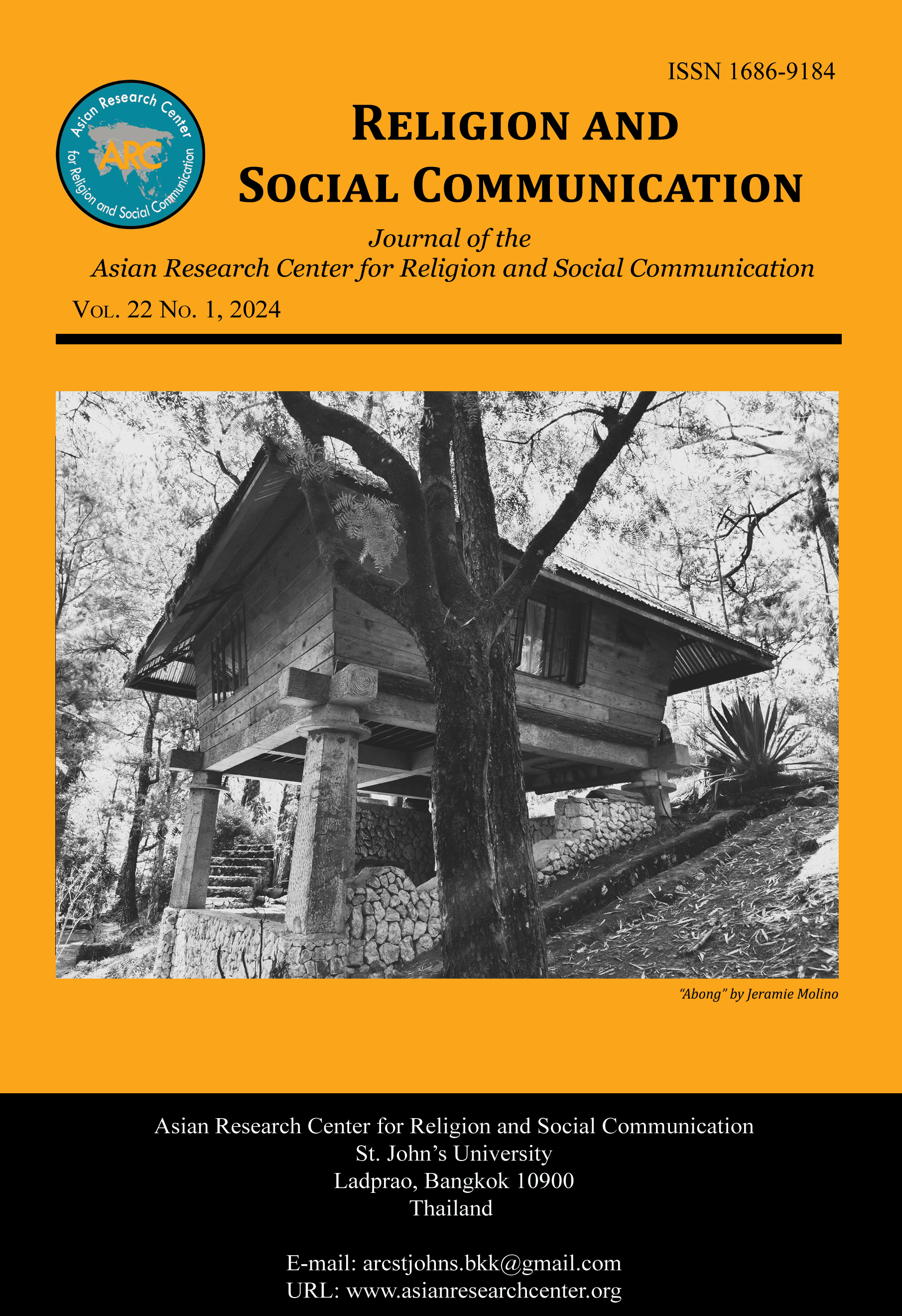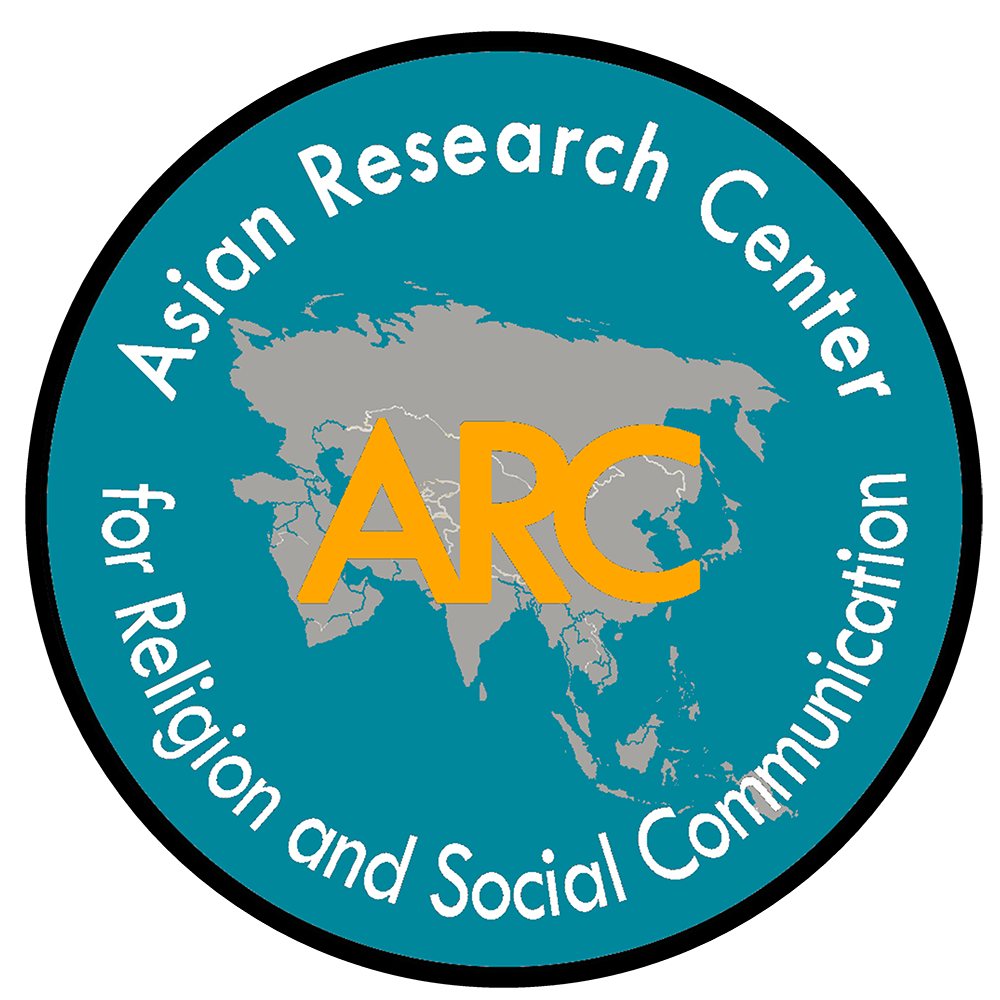[EDITORIAL]Transcending Boundaries: A Global Academic Discourse on Culture, Faith, and Ethics
Download
RELIGION AND SOCIAL COMMUNICATION VOLUME 22, NO. 1 (2024)
ISSN 1686-9184
Author
Rico C. Jacoba (Guest Editor)
PAGES 1-6
DOI:
In the pursuit of World-Class University (WCU) status, the current global challenge is intricately tied to upholding stringent academic standards and fostering a robust research profile. Esteemed ranking systems, such as those curated by Shanghai Jiao Tong University, TIMES Higher Education, and the Higher Education Evaluation and Accreditation Council of Taiwan, consistently underscore the indispensability of impactful research output in achieving esteemed WCU status.
However, the Philippines currently faces challenges on multiple fronts, hindering its standing in the global university rankings. The Times-QS ranking for 2023 positions the Philippines as a middle power in Asia, ranking 16th out of 26 countries and territories in overall comprehensive power.
The challenges include measly support for education and research from the state, a lack of/minimal budget for research among HEIs, and no/insignificant incentives for research. The resulting dismal research output from graduate schools further exacerbates the problem. The systemic nature of these challenges underscores the need for multifaceted solutions.
To address this, it is imperative to scrutinize the challenges to research in Philippine Higher Education Institutions (HEIs) and implement comprehensive interventions. The implementation of CHED Memorandum Order Number 15, Series of 2019, marks a transformative milestone. This mandate compelling graduate students to publish or substantiate acceptance of their research studies in reputable journals signifies a commendable leap towards aligning the Philippine higher education system with stringent international standards.
National interventions, such as the requirements outlined in the CHED Memorandum Orders of 2012 and 2019, establish criteria for research engagement in universities seeking autonomous status. These requirements emphasize the percentage of full-time faculty engaged in scholarly works, patents or publications, and the importance of publications in indexed journals or reputable presses. These national interventions are crucial steps towards fostering a culture of research.
Institutional interventions play a pivotal role in addressing the challenges to research. Ongoing capacitation for faculty, faculty engagement in research through grants, and long-term incentives for research and publication are essential components of institutional support. Graduate school innovations, such as refocusing towards more research and publications and the incorporation of mentoring and research assistantship, contribute significantly to enhancing research capacities.
In the quest to enhance research capabilities and secure a commendable position in global university rankings, the Philippines has embarked on a comprehensive approach, involving capability-building, program innovations, policy development, and financial investments. This focused effort underscores the necessity of elevating research quality in Philippine Higher Education Institutions (HEIs) as a crucial component of internationalizing standards. Responding to this imperative, Religion and Social Communication presents a special issue featuring scholarly articles mostly centered on the Philippines context, addressing challenges and contributing diverse insights. This collection aims to foster a culture of research, propelling Philippine HEIs onto the global academic stage. Through these contributions, the special issue serves as a catalyst for transformative action, emphasizing the urgency of advancing research endeavors in the nation.
In Joefrey M. Almazan’s exploration, titled “Naindayawan-a-Rambak-ti-Gimong: An Inculturation of the Eucharist in Ilocano,” the Ilocano celebration of the Eucharist is depicted as a distinctive and deeply ingrained cultural phenomenon. This work delves into the intricate integration of Ilocano cultural elements into the sacred act of the Eucharist, presenting it not as a mere replication of universal Christian traditions but as a dynamic fusion of faith and culture. Almazan emphasizes the necessity of preserving and celebrating cultural diversity within religious rituals, challenging the notion that such distinctiveness deviates from religious norms. By revealing the layers of meaning in Ilocano religious practices, the article advocates for a broader appreciation of the interplay between faith and cultural nuances in the Eucharistic celebration, recognizing diversity as a source of spiritual richness within the Ilocano community.
Fred F. Antonio, Jr.’s investigation, titled “The Significance of Food in the Parable of the Wedding Feast in Matthew 22:1-14 and the Kanyaw,” establishes connections between the Biblical tradition and the Cordillera tradition by comparing the Parable of the Wedding Feast in the Gospel of Matthew with the Kanyaw ceremony. This study illuminates the deep cultural meanings inherent in both narratives, providing insight into the parallels between Biblical and Indigenous traditions. The article contributes to a more profound understanding of religious texts by bridging the gap between these narratives and highlighting the cultural contexts that influence their interpretations.
Marisa Basiwal-Ao-wat and Carmelita Tovera-Ayang-ang’s work, titled “Roles of Indigenous Peoples Leaders in the Indigenization of Education,” is particularly relevant within the context of the Indigenous Educational System in the Cordillera region. This research addresses a crucial dimension of education – the indigenization process – which involves incorporating Indigenous knowledge, values, and cultural perspectives into the educational system. By specifically emphasizing the roles of Indigenous leaders in this process, the article advocates for a more inclusive and culturally sensitive approach to education tailored to the unique needs of the Cordillera’s Indigenous communities. This perspective contributes significantly to the ongoing discourse on decolonizing education, promoting a shift away from Eurocentric models towards educational frameworks that honor and integrate the rich cultural heritage of the Cordillera’s Indigenous Peoples. The work serves as a valuable resource for educators and policymakers seeking to foster an educational environment that respects and reflects the diverse cultural identities within the Cordillera region.
George Canilao Tumbali’s study, “The Impact of the Cityhood of Tabuk on Human Development,” is particularly relevant to the people of Tabuk in Kalinga, Philippines, as they seek a progressive living environment. Examining the repercussions of Tabuk attaining cityhood status, the research offers a localized perspective on broader human development challenges. Tumbali’s comprehensive analysis contributes valuable insights to the discourse on urbanization and its effects on well-being. For Tabuk residents, this research guides them in navigating the changes brought by urbanization, facilitating assessments of the impact on social, economic, and environmental aspects. As the community strives for progress, Tumbali’s work aids informed decision-making and the formulation of policies tailored to address specific needs and aspirations, advancing human development in Tabuk.
Jeramie N. Molino’s study, “Ecofeminist Perspectives and Familial Dynamics: Exploring Women’s Roles in Environmental Sustainability and the Filipino Concept of ‘Ate,’” is crucial for understanding the intricate connections between ecofeminism, familial dynamics, and environmental sustainability in the Philippines. By delving into the unique cultural significance of the Filipino term “Ate” (elder sister), Molino’s research reveals how Filipino women, embodying nurturing qualities associated with elder sisters, play vital roles in fostering environmental consciousness and sustainability. This work significantly contributes to the broader discourse on ecological care in the Philippines by intertwining ecofeminist perspectives, familial dynamics, and the cultural nuances shaping women’s impactful contributions to environmental conservation efforts.
“Taflurut Nit: Towards an Inculturated Theology of the Communion of Saints for Kei People in Eastern Indonesia,” Longginus Farneubun and Rico Casta Jacoba delve into the religious beliefs of the Kei people in Eastern Indonesia. Their article provides insights into the inculturated theology of the Communion of Saints, offering a bridge between theology and local cultural practices. This study is a valuable addition to the growing body of literature on the intersection of faith and culture.
Dennis M. Placido’s work, titled “Jumpstarting Ethno-philosophy in Context: Ethics Discourse on Gawis ya Ngawi,” serves as a gateway into the realm of ethno-philosophy, specifically within the cultural context of the Indigenous People of the Cordillera, particularly among the Kankanaey community in the Philippines. Placido’s research delves into the ethical discourse surrounding Gawis ya Ngawi, a concept deeply rooted in the cultural fabric of the Kankanaey people. The Kankanaey people are an Indigenous people of the Northern Philippines. They are part of the collective group of indigenous people known as the Igorot people. By engaging with this ethical discourse, the article prompts a reevaluation of philosophical perspectives, urging us to consider and appreciate the diverse worldviews embedded in the indigenous traditions of the Cordillera. Placido’s work encourages a deeper understanding of the ethical frameworks within the Kankanaey culture, fostering a respectful exploration of their unique philosophy and contributing to the broader discourse on ethno-philosophy.
In the study done by Ronald O. Ocampo and Rema Bascos-Ocampo they presented how Marag Valley in Apayao, Philippines residents destigmatized the aftermath of the Communist Party of the Philippines – New People’s Army (CPP-NPA) occupation. Through qualitative research focusing on narratives from local leaders, the study identifies eight sub-themes, including the effectiveness of government peace agreements, inter-agency collaboration, positive community image creation, education's importance, using Marag Valley as a tourist destination, incorporating ethical values, and leveraging social media. The findings highlight the interconnectedness of governmental initiatives, community values, education, and media in reshaping the narrative around the war's aftermath in Marag Valley, offering valuable insights for policymakers, community leaders, and researchers interested in post-conflict recovery and community resilience.
In the context of a study in Delhi on the ethical use of social media by religious organizations, Sudeep Paul’s “Ethical Considerations in Social Media Utilization by Religious Organiza-tions” presents a globally relevant discourse. As technology and faith intersect in today’s landscape, the ethical dimensions of online engagement are crucial. Paul’s work challenges researchers and readers to consider these issues not only in the local context of Delhi but on a global scale. In our interconnected world, where social media impacts transcends boundaries, there is a pressing need for ethical considerations in the digital realm. This article compellingly advocates for a global perspective, emphasizing collaborative efforts to address ethical challenges at both local and global levels where technology and faith intersect.
In our quest for knowledge, let us answer the summons to surpass borders, whether they be local or global, in our research pursuits. The showcased articles span a spectrum of topics, from investigating indigenous celebrations in the Philippines to examining the inculturated theology of the Kei people in Eastern Indonesia and exploring the ethical use of social media in the National Capital Region, Delhi, India. Together, they emphasize the wealth that arises when a myriad of perspectives come together.
The imperative to challenge ourselves as readers and researchers is clear – to break free from intellectual silos and engage in collaborative efforts that bridge cultural divides. As we delve into the intricate tapestry of human experiences across different regions, let these articles serve as a testament to the transformative power of collaboration, fostering a global dialogue that not only enriches our collective understanding but also propels us towards a more interconnected and harmonious world. In an era where information knows no bounds, the responsibility to explore, learn, and collaborate on a global scale becomes not just an academic pursuit but a shared commitment to the advancement of knowledge and the promotion of unity amid diversity.





